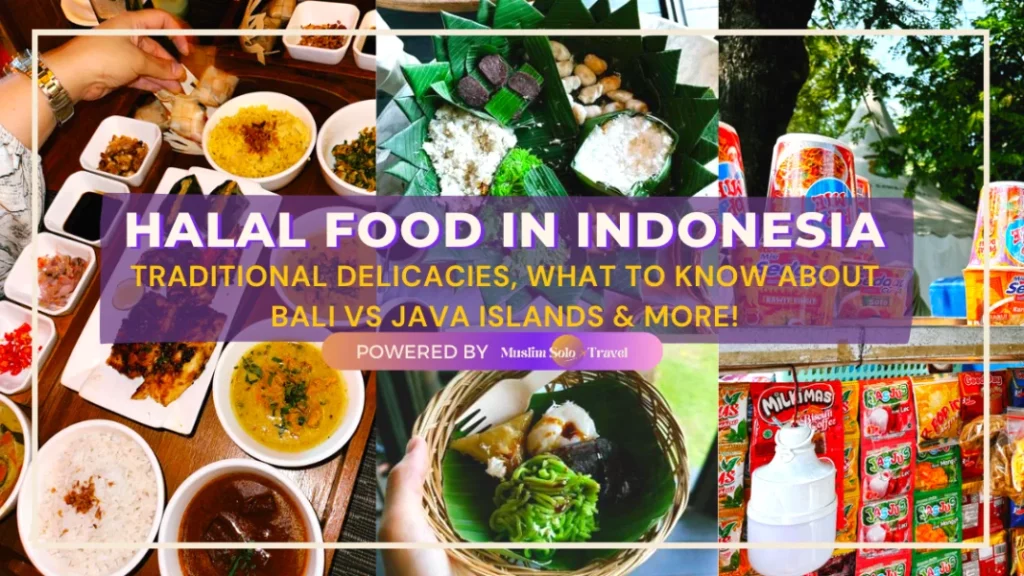
If you’re someone who immediately associates that “everything is Halal” in the largest Muslim-populated country in the world, this article is for you because the truth is… “not everything is Halal” in the also multi-cultural, multi-religious country.
Plus, if you’re solo traveling from Java Island to Bali Island, and vice versa, then you have to be quick to shift your thinking, as the societal rules are different on both islands.
From Self-claim Halal establishments vs. Halal-certified to non-Halal words to look out for, Bali Belly, Must-Try Traditional Dishes, here’s everything you need to know about Halal food in Indonesia.
- Is Indonesia a Muslim country?
- Is Everything Halal in Indonesia?
- How To Know What is Halal in Indonesia?
- Is Halal Food Easily Available in Bali?
- Non-Halal Words & Non-Halal Dishes to watch out for in Yogyakarta & Solo
- Stalls and Restaurants With the Word "Manado"
- Halal Traditional Indonesian Dishes & Desserts!
- What You Should Know About Bali Belly (Untreated Water Source) Phenomenon
- Street Food & Vendors in Indonesia – Eat At Your Own Discretion
- Wrap Up – Halal Food in Indonesia
Is Indonesia a Muslim country?
For an in-depth understanding of “Is Indonesia a Muslim Country?” check out our upcoming Muslim Solo Travel Guide to Indonesia. Stay tuned to our newsletter, which you’ll immediately get instant access to when you join the #MuslimahSoloTravelers Community.
Is Everything Halal in Indonesia?
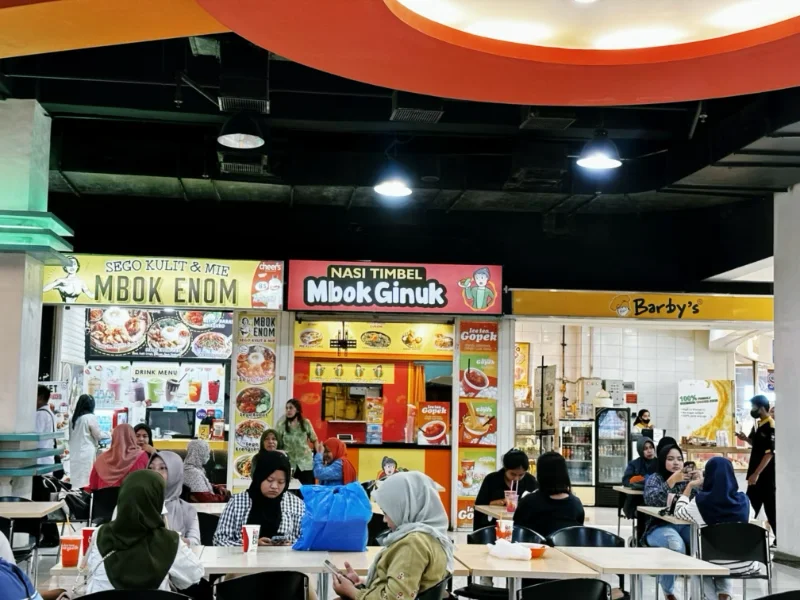
Being known as the country with the largest Muslim population in the world, it is easy to link this fact with the notion that “everything is Halal in Indonesia”.
The truth is not everything is Halal in Indonesia.
Halal is beyond “not having pork” and encompasses how an animal is slaughtered, cleanliness, the ingredients, and so much more. Read all about it here.
Some facts to know:
- Indonesia is a multi-religious and multicultural country. Christians, Hindus (the largest Indonesian Hindu community is found in Bali) and Buddhists are also part of the Indonesian demographics, so you can expect there to be food that caters to these communities too.
- It is easier to find Halal food in Indonesia on the main islands such as Java (where Jakarta is located), Sumatera, some parts of the Indonesian Bornean region, and Lombok Island, as local Indonesian Muslims mainly inhabit these islands.
How To Know What is Halal in Indonesia?
While now that we know that “everything is not Halal” in Indonesia, what is considered Halal in Indonesia can be spotted in different types:
Self-claim Halal in Indonesia
There are a couple of ways how Indonesian restaurants/stalls showcase that they’re self-claimed Halal:
- A non-official “Halal” logo (in Arabic or Romanized language) on the front of their place; or
- Islamic symbols like the word “Muslim food” on their restaurant name, or anything related to Islam in their slogan like “Bismillah.”
- Arabic calligraphy, Quranic verses on their restaurant premises. Some would even blast out Quranic verses on speakers.
- Local slogans & understanding that the restaurant is “automatically Halal” based on the origins of the food they serve, like “Makanan Padang” (food from Padang, which is a place where Muslims reside), “Makanan Jawa” (food from Java island, where Muslims reside). So if you see these words of Indonesian destinations at a restaurant or stall, it indicates that the food is Halal.
According to Gia, you can even trust the word “Masakan Jawa” (Javanese food in translation) as Javanese are predominantly Muslims.
Do note that nothing is wrong with the meat and ingredients of these “self-claimed” places in Indonesia.
It’s just that some of these establishments do not care yet to get themselves certified as culturally; it is accepted by the local society that their business is Halal.
Or some are Hole-in-the-wall, small business eateries and for them to get certified, it’s a hassle for them.
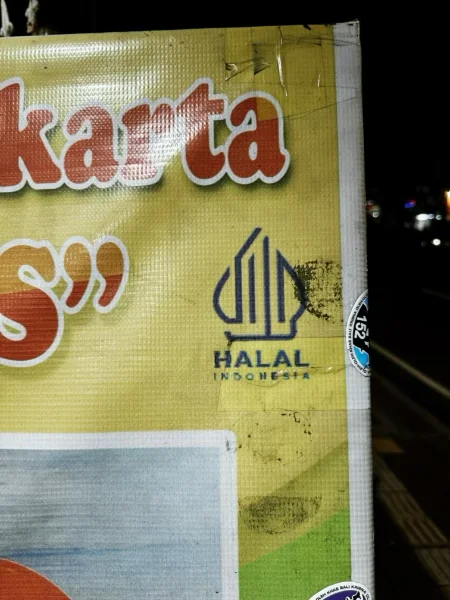
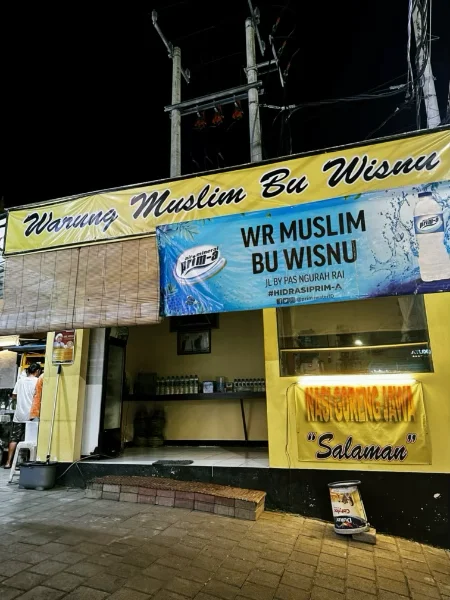
Halal-certified Establishments & Food Products in Indonesia
If you see any restaurants, eatery establishments, or even food sold in the country with any of these two logos, they are certified Halal at the highest standards by the Country’s Authority, Majlis Ulama Indonesia (MUI).
MUI is the governing body of Indonesia’s government to ensure the Halal standards of products and food premises. More on the regulations here.
Today, the country is transitioning to the purple logo, but both are accepted.
The Indonesian government has also recently made a mandate that by 2024, all premises, restaurants, and food retailers must get themselves Halal certified to minimize confusion among consumers.
So that’s excellent news as you won’t have to double-check and clarify for Halal food in Indonesia soon in sha Allah!
Is Halal Food Easily Available in Bali?
The answer is yes and no, depending on where you are exactly in Bali.
This can also be to certain locations and time of the day, it can be difficult to find Halal food in Bali, and vice versa.
Non-Halal Words & Dishes to Watch Out For and Things To Know (Especially in Bali!)
As Bali is home to the Indonesian Hindu population, some non-Halal words and things to know are:
- Pork (babi in Indonesian) is commonly found on the island and is in most “Authentic Balinese” restaurants. You’ll find signages and words such as:
- “Babi guling” (rolled roasted pork in Indonesian) is plastered in majority of the places on the island.
- “Soto Babi”
- “Satay Babi”
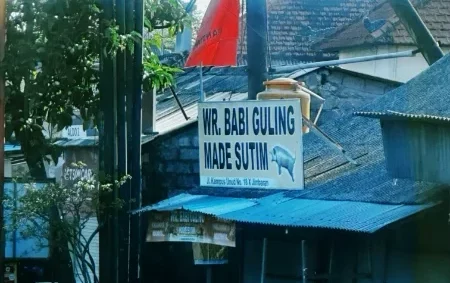
- As Balinese cuisine contains a mixture of Indonesian, Indian, and Chinese influences, beware of the word “Swikee” or “Swike”. This is a Chinese Indonesian Frog Leg dish, a popular dish in Bali and throughout Indonesia.
- Vegetarian and seafood options are also available if all else fails.
- The fast food in Bali is all Halal, as you can see with the “Halal Indonesia” signages on the front door. So if you have no idea what to eat, fast food is there to rescue you!
- Arak or Brem in Bali and Nusa Tenggara. These are alcoholic beverages and rice wine that are commonly found in Bali.
Don’t let this information freak you out just yet. Halal food is available if you know what to look for.
Non-Halal Words & Non-Halal Dishes to watch out for in Yogyakarta & Solo
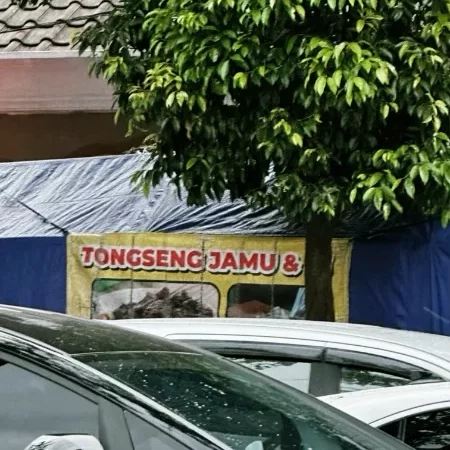
- Jamu is dog meat in Indonesian and is commonly found in Yogyakarta or Solo.
- Tongseng “Jamu” (Jamu is dog meat)
- Satay/sate “Jamu”
Stalls and Restaurants With the Word “Manado”
If you see a stall or restaurant with Manado on it, most probably the food served are not Halal so just make sure you’re alert.
If there’s no Halal certification, double-check the menu for Non-halal words (refer to them above).
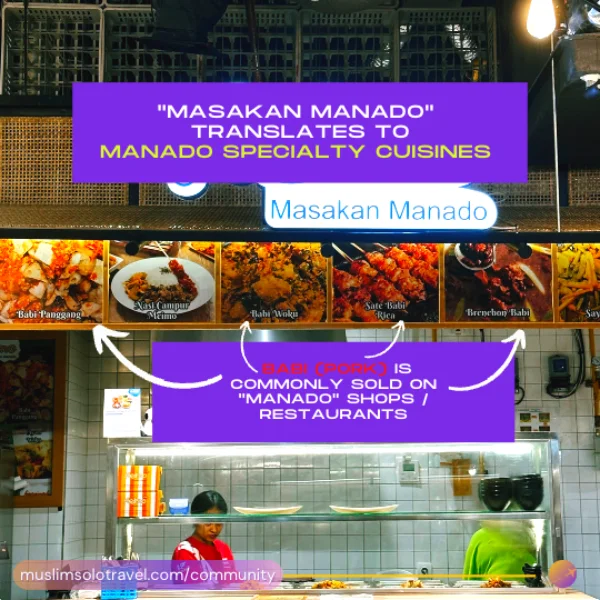
Halal Traditional Indonesian Dishes & Desserts!
Wherever you go in the country, you’ll find some similarities in the traditional dishes and desserts. Here are some traditional Halal Indonesian dishes that you must try.
Most of these dishes can be found in traditional Indonesian restaurants, some on street vendors and push-carts!
Nasi Goreng
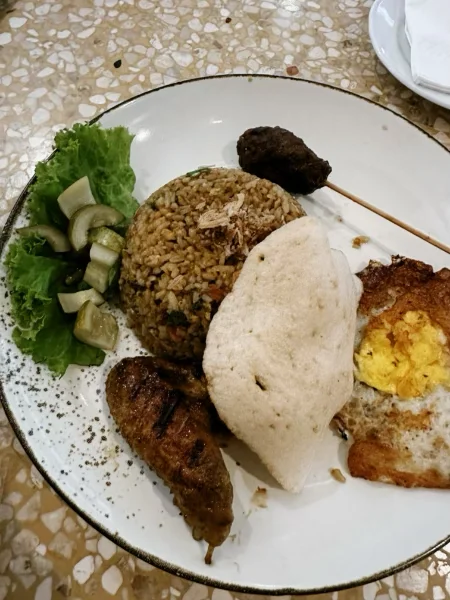
Nasi Goreng is a humble Indonesian fried rice with vegetables, meat, and a fried egg on top.
What makes this dish, in particular truly Indonesian is that it would come with an assortment of Kerupuk (crackers!)
Nasi Padang
Padang Rice is steamed rice that is eaten with various side dishes.
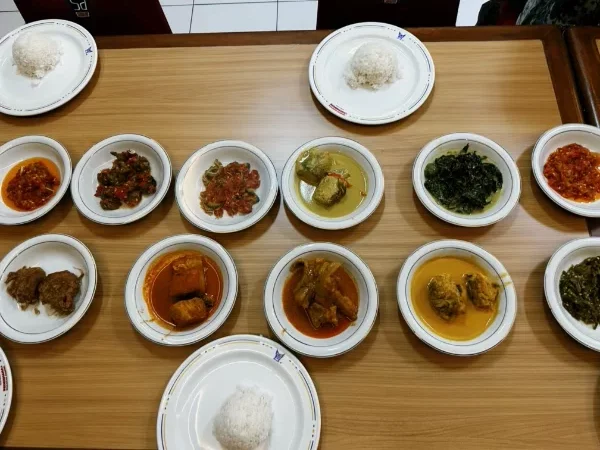
Originating from the Minangkabau tribe, the majority in West Sumatra, you’ll be shocked at how many side dishes this rice can come with! It is named after Padang, the capital of West Sumatra.
It can even fill up a long table!
Usually, when you eat in any “Nasi Padang” shop, the way it works is that you’ll be served with rice alongside many side dishes. And they will deduct based on the amount of food that you choose to eat.
Some Nasi Padang shops also come with self-service.
Gado-Gado
Beware, as this is not your ordinary salad.
Gado-gado is a mixed vegetable salad made up of slightly blanched or steamed vegetables and hard-boiled eggs, potato, fried tofu, and tempeh served with peanut sauce.
Considered as one of the country’s national dishes, you may even be addicted to gado-gado after trying it.
Asinan Betawi
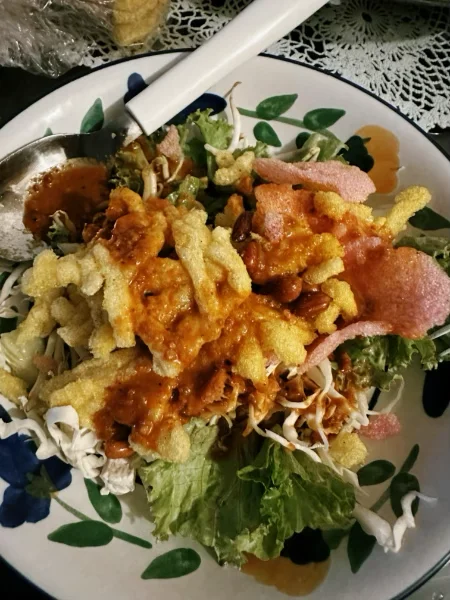
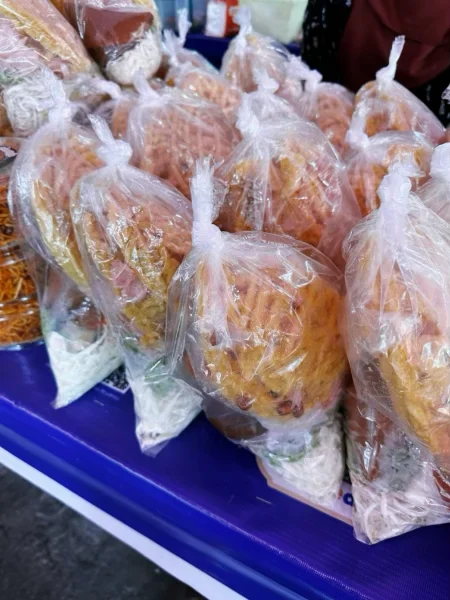
From a slight glance, you’ll think that Asinan Betawi is no different from Gado-gado.
Asinan Betawi is the specialty of the Betawi tribe, the original Jakartans.
Unlike gado-gado, which has hard-boiled eggs, Asinan has a more “pickled” taste, and the salad mixture is made out of bean sprouts, tofu, cabbage, and some crackers on the side.
The best time to taste Asinan betawi is during Ramadhan, when you can get it sold at Ramadhan Takjil Bazaar in Benhil, Jakarta.
Bakso
If you’re a fan of meatballs, then you’ll have to try the Indonesian Bakso!
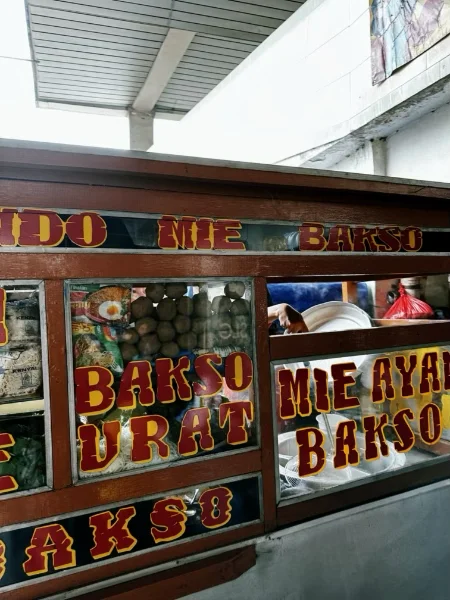
Wherever you go in the country, you’ll find different types of Bakso sold in restaurants, push carts by the streets, or in the food court.
Bakso’s various versions are Bakso Beranak, Bakso Urat and so much more!
Soto
Any soup lover must try Soto!
This is an Indonesian traditional soup that is comprised of meat, broth, and vegetables. Sometimes soto can also be complemented with Ketupat (square sticky rice generally served during Eid) or vermicelli.
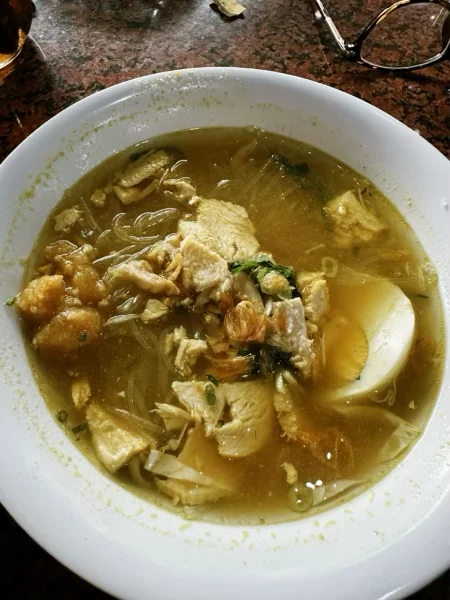
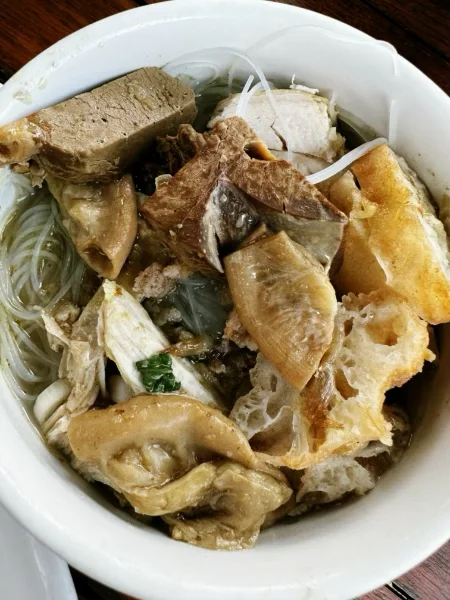
Warning: Be careful if you’re eating soto in an Indonesian region populated by non-Muslims. Soto Babi (pork-based) is a famous dish in Bali and Manado.
Es Teler
Traveling solo on the humid tropical island, you must quench yourself with a shaved ice dessert!
In Indonesia, Es Teler is a favorite fruit cocktail comprising avocado, jackfruit, grass jelly, coconuts, and pandan, and drizzled with condensed milk and local palm sugar.
Our favorite Es Teler is from Es Teler 77!
Es Selendang Mayang
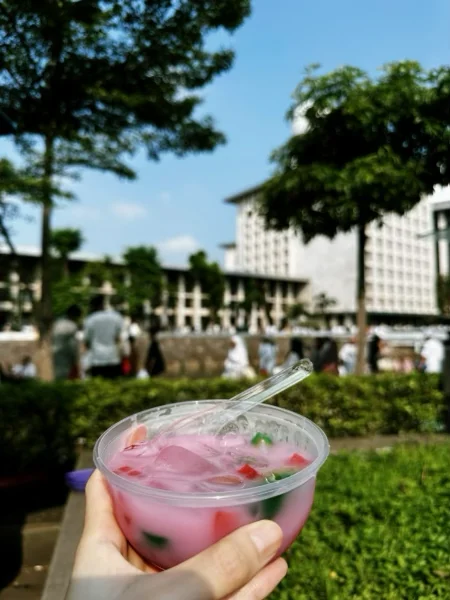
This is a favorite Ramadhan delicacy that originates from the Betawi tribe in Indonesia.
To be exact, layer cake that is drizzled with coconut gravy and local sugar syrup.
While you can get this in Ramadhan bazaars in Indonesia, you can also try it during Eid morning in major masjids in the country like Istiqlal Mosque (check out our Travelog there to see the experience)
From the direct translation of the name, the dessert means Mayang Shawl (weird, right?).. but do not be deterred by its name because once you’ve tasted it, especially on a hot sunny day, you’ll crave more!
Indomie
Well…. what else to eat when in Indonesia, right?
As the home country of the world-famous Indomie, you’ll find humble sidewalk stalls and even push carts selling Indomie throughout the country.
These restaurants or stalls sell the national noodle of the country, home-cooked style. So if you ever spot these hole-in-the-wall establishments, it’s time to forget about your style of cooking the Indomie and give these Indomie, the Indo-style, a try!
How to spot it? Just see the sign “Indomie” on the restaurants. Some even have the poster of the Indomie covered all over their tiny table for patrons dining in.
What You Should Know About Bali Belly (Untreated Water Source) Phenomenon
Now, let us preface this by saying this is not just a Bali phenomenon
Context: Bali Belly is a ‘derogatory term’ coined after “Traveler’s Diarrhea.” Commonly experienced in Bali, as that is the country’s top destination among international tourists.
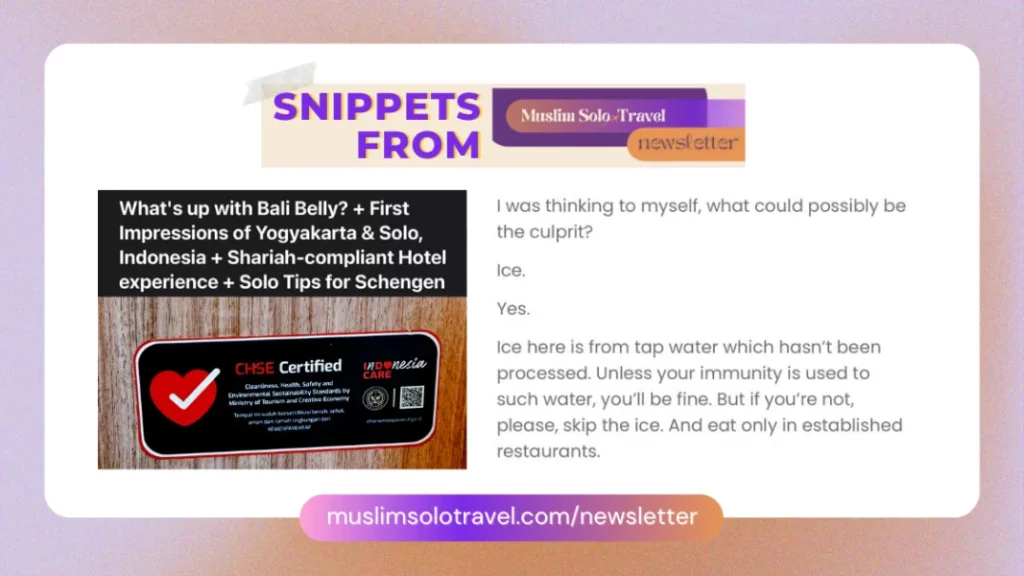
As per our experience in Java Island (which first appeared in the #MuslimSoloTravel newsletter), this is when you drink contaminated water… which can come from various sources:
- Tap water (please do not drink tap water in Indonesia unless your tummy and immunity are used to such water!)
- Ice cubes (because ice cubes in the country are made from unprocessed tap water)
- Some street vendors because of cleanliness (more about it below)
- Spicy food. The level of spiciness here can be extreme as pretty much everything comes with sambal, so tread your sambal intake CAREFULLY!
What Happens if You Get Traveler’s Diarrhea in Indonesia?
You’ll get sick, feel nauseous, and take frequent bathroom trips for up to one week.
To end your Traveler’s Diarrhea quickly, a visit to the hospital or clinic should do the trick. Otherwise, this 👇 Over-the-counter (OTC) herbal drink can help!
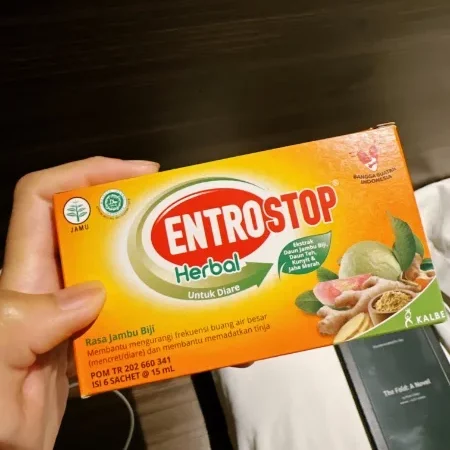
MST Tip: So unless you’re adventurous, just be extra mindful of what you consume in the country. On the safe side, eating at established eateries are most recommended
Street Food & Vendors in Indonesia – Eat At Your Own Discretion
As mentioned previously, Halal also comprises cleanliness. The thing about some Indonesian street food and vendors are that…
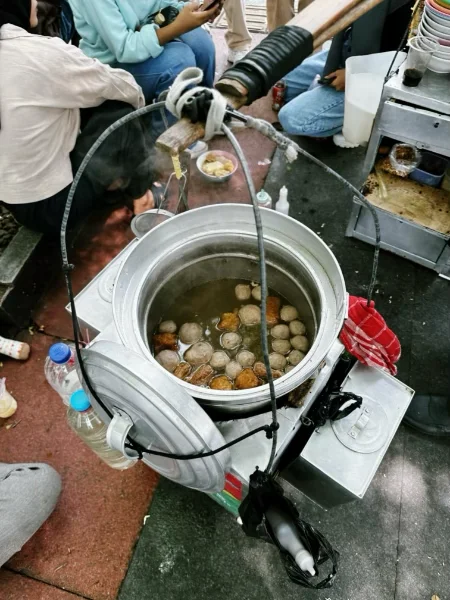
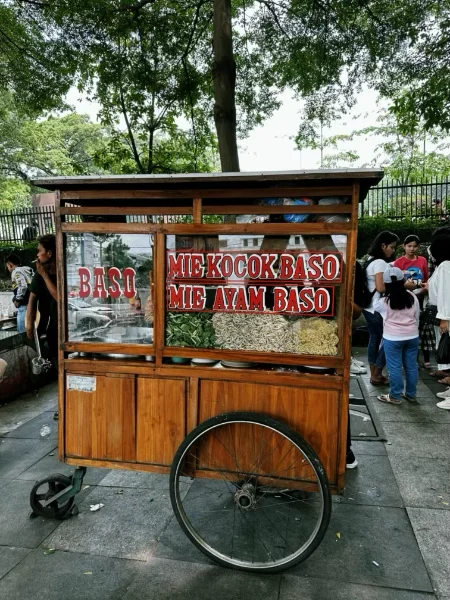
The cleanliness aspect is still lacking.
Not because the street vendors do not try to be clean.
This is due to many factors, such as (1) the overpopulation crisis and (2) water shortages, which the government is trying to address by moving the capital city to Nusantara on Borneo Island.
Wrap Up – Halal Food in Indonesia
We hope this helped you understand the Halal food culture and norms in Indonesia.
For more Halal Food inspirations in Indonesia, check out what to eat in Pontianak.
Join the Muslimah Solo Travelers Community & share your solo travels in Indonesia with us! 💜
